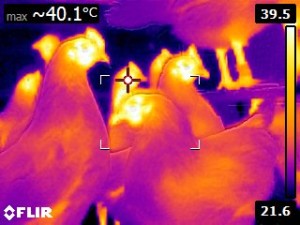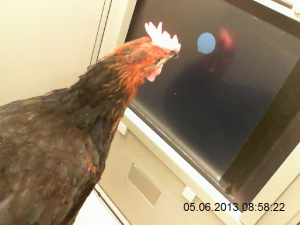Research interests
Article 13 of the 2009 Treaty on the Functioning of the European Union recognises animals as sentient beings and awaits full regard to be given to the welfare requirements of animals while formulating and enforcing EU policies in various fields, including agriculture. Domestic chickens are the world’s most widely farmed animal, reared for meat (broilers) and egg production (laying hens). The global population of the domestic chicken was more than 26 billion birds in 2022. This is one of the reasons why the “quality of life” of poultry receives increasing attention from general public and scientific community.
Animal welfare research has been historically over a long time focused on negative phenomena such as fear, pain or suffering, or on how to prevent or minimize them. Our laboratory has also been focused on abnormal behaviours in poultry, including stereotyped behaviour induced by feed restriction in broiler breeders, or feather pecking in laying hens.
However, our focus is increasingly shifting to the study of positive welfare, the positive experiences of farm animals. The aim is to identify and validate appropriate indicators of positive welfare and to specify situations or resources inducing positive experiences. In this field, our team is involved in several international projects, specifically focused on positive welfare (COST action CA21124 Lifting Farm Animal Lives – laying the foundations for positive animal welfare and the Horizon project European Partnership on Animal Health and Welfare), and the focus of our research is also changing respecting this trend. Our approach is characterized by combining behavioural methods with physiological indicators (radiotelemetric measurement of blood pressure, heart rate, EEG, study of neurotransmitters and their receptors involved in behavioural control, especially the role of dopamine,or the use of infrared thermal imaging).
The interaction between cognition and emotion represents a relatively new source of information for animal welfare science, as emotions influence cognitive performance not only in humans but also in animals. This interaction can be studied using affect-induced cognitive biases. To study the interaction between affective states and cognitive performance in poultry, we use operant conditioning in a custom Skinner boxes with a touch screen.
People
RNDr. Ľubor Košťál, CSc. – head of the group
RNDr. Boris Bilčík, PhD.
Mgr. Katarína Pichová, PhD.
Vladimír Géci – animal keeper
Bc. Lenka Plšková – Master student
Zuana Mihaliková – Bachelor student
Allumni
2023 – Mgr. Zuzana Skalná, PhD. – PhD. thesis
2020 – Mgr. Daniela Ledecká, PhD. – PhD. thesis
2016 – Mg. Katarína Pichová, PhD. – PhD. thesis
2006 – Mgr. Marek Rajman, PhD. – MSc. and PhD. thesis
2005 – MVDr. Monika Sedláčková, PhD. – PhD. thesis
2001 – Mgr. Ľubica Niederová – Kubíková, PhD. – Bc., MSc., and PhD. thesis
2000 – RNDr. Boris Bilčík, PhD. – PhD. thesis
2022 – Bc. Lenka Plšková – Bc. thesis
2019 – Mgr. Daniel Pankuch – Bc. and MSc. thesis
2012 – Mgr. Andrea Kohútová – Bc. and MSc. thesis
2011 – Mgr. Mária Horváth – Bc. and MSc. thesis
Collaborations
- Prof. T. Bas Rodenburg – Wageningen University & Research, Behavioural Ecology Group, Holandsko
- Dr. Joanne L. Edgar – University of Bristol, UK
- Prof. Randi Oppermann Moe – Norwegian University of Life Sciences, Faculty of Veterinary Medicine and Biosciences, Department of Production Animal Clinical Sciences, Norway
- Prof. Linda J. Keeling – Swedish University of Agricultural Sciences, Department of Animal Environment and Health, Sweden
- Prof. Inma Estévez – Neiker-Basque Institute for Agricultural Research and Development, Department of Animal Production, Spain
Participation in international projects
- 2024 – 2027 – EUP_AHW HORIZON-CL6-2023-FARM2FORK-01: European Partnership of Animal Health and Welfare (101136346) – Horizon, 2024-2027
- 2022 – 2026 – COST LIFT – Lifting Farm Animal Lives – Laying the Foundation for Positive Animal Welfare (CA21124)
- 2016 – 2020 – COST KBD – Identifying cause and solutions of keel bone damage in poultry (CA15224)
- 2016 – 2020 – COST GrouHouseNet – Synergy for preventing damaging behaviour in group housed pigs and chickens (CA15134)
- 2010 – 2014 – Animal WelfAre Research in an Enlarged Europe (265686 AWARE) – FP7 project KBBE
Outreach (in Slovak)
- Are we what we eat? What the (un)comfort of farm animals says about us – verejná diskusia (2023)
- Welfare is fair – časopis Akadémie (vol 6/2023, 18 – 23)
- A hen is not a thinker, but she is not stupid – Téma (vol 17/2022, 42 – 50, ISSN 2585-7843)
- he way hens are kept is reflection of society. How are Slovaks doing? – PODCAST Veda na dosah (2020)
- Eggs from happy hens – Index SME (2012)
- About animal welfare – Rádio FM (2012) – RNDr. Ľubor Košťál, CSc.
- Bird brain and learning – Spektrum vedy (2011) – Part 1, Part 2







